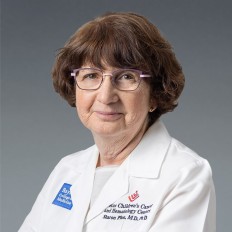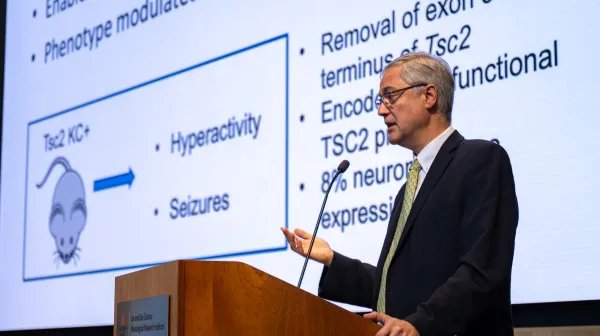HOUSTON - (Jan. 28, 2016) - Combined whole exome tumor and blood sequencing in pediatric cancer patients revealed mutations that could help explain the cause of cancer or have the potential to impact clinical cancer care in 40 percent of patients in a study led by researchers from Baylor College of Medicine and Texas Children’s Cancer Center.
The sequencing revealed unexpected findings in a number of patients, including mutations in genes not previously associated with the specific type of cancer that had been diagnosed, pointing toward the usefulness of broad-based testing of both tumor and blood samples for children diagnosed with solid tumors, say study senior co-authors Dr. Sharon Plon, professor of pediatrics at Baylor, and Dr. Will Parsons, associate professor of pediatrics at Baylor and Texas Children’s Cancer Center.
The study, which appears in the current issue of JAMA Oncology, is part of the ongoing Baylor College of Medicine Advancing Sequencing in Childhood Cancer Care (BASIC3) project funded through a $6.6 million grant from the National Human Genome Research Institute and the National Cancer Institute.
More than 25 percent of patients in the study had a genetic mutation of potential clinical relevance detected in their tumor, including some that could guide selection of treatment in the event of tumor recurrence, reported Dr. Angshumoy Roy, assistant professor of pathology & immunology at Baylor and Texas Children’s Hospital and one of the study contributors. Nearly 10 percent had germline mutations in adult and pediatric cancer susceptibility genes that explained the cause of their cancer, and additional patients had mutations in genes that were related to risk of diseases other than cancer.

“Our findings were much broader than what we expected in both the tumor and the blood,” said Plon, who also is professor of molecular and human genetics at Baylor and director of the Cancer Genetics Clinical and Research Programs at Texas Children’s Hospital. “In a significant number of cases, results revealed mutations in genes that we would not even have thought of testing for, because they were not known to be associated with childhood cancer. These results suggest that using focused genetic testing could miss important findings.”
The study reported the results from the first 150 newly-diagnosed solid tumor patients enrolled on the BASIC3 study at Texas Children’s Cancer Center. The BASIC3 project is nearing completion of enrolling 280 patients from the center.

“An important aspect of this study is its focus on both what the tumor can tell us in terms of potential molecular targets for treatment but also what the blood samples reveal about the risk of hereditary cancer and other genetic diseases for the patient and their family,” said Parsons.
“This is an important study and a powerful illustration of how genomic data can be effectively used by skilled physicians in a clinical context,” said Dr. Richard Gibbs, professor of molecular and human genetics and director of the Human Genome Sequencing Center at Baylor. Gibbs and Dr. Christine Eng, professor of molecular and human genetics at Baylor, lead the study’s efforts to perform genomic testing – conducted at the Whole Genome Laboratory at Baylor – and evaluate results.
In the same issue of JAMA Oncology, a team led by investigators from Dana-Farber/Boston Children’s Cancer and Blood Disorders Center reported similarly successful efforts to generate genomic-based treatment recommendations for patients with pediatric solid tumors.
The overall goal of the BASIC3 project is to integrate blood and tumor whole exome sequencing information obtained at the time of diagnosis into the clinical care of childhood cancer patients with solid tumors and brain tumors.
In addition to developing protocols for performing clinical genomic testing and evaluating the results of this testing for patients enrolled in the study, the project also is exploring the ethical and social issues related to genomic testing, including the preferences of both families and oncologists for the reporting of these complex results and methods for improving the communication between families and oncologists. These efforts are led by Drs. Laurence McCullough and Richard Street of Baylor. Initial results of this portion of the study recently were reported in the journal Pediatrics. Read more about this work in the Baylor press release.
The BASIC3 project and related studies have facilitated the development of prospective clinical trials using “precision oncology” or “personalized medicine” approaches for childhood cancer patients, including the National Cancer Institute Pediatric MATCH trial that will use DNA and RNA sequencing of tumor and blood samples to guide selection of molecularly-targeted therapies for children with relapsed and refractory cancers. The trial will be conducted through the NCI-funded Children’s Oncology Group (COG) consortium and led by COG and NCI investigators including Drs. Parsons, Plon and Stacey Berg, professor of pediatrics at Baylor and Texas Children’s Cancer Center.
Others involved in this study include Dolores Lopez-Terrada, John Hicks and Jed Nuchtern, of Baylor, Texas Children’s Cancer Center and Texas Children’s Hospital; Sarah Scollon, Katie Bergstrom, Robin Raez-Martinez, Stephanie Gutierrez, Abhishek Bavle, Frank Lin, Murali Chintagumpala, Adikunle Adesina, Sanjeev Vasudevan, Federico Monzon, Karen Eldin, Norma Quintanilla, Carrie Mohila, William Whitehead, and Andrew Jea of Baylor and Texas Children’s Hospital; Yaping Yang, Andrea Peterson, David Wheeler, Christine Eng, Richard Gibbs, Tao Wang, Susan Hilsenbeck, Uma Ramamurthy, Jeffrey Reid, Donna Muzny and Amy McGuire, of Baylor.
About Texas Children’s Hospital
Texas Children’s Hospital, a not-for-profit health care organization, is committed to creating a healthier future for children and women throughout the global community by leading in patient care, education and research. Consistently ranked as the best children’s hospital in Texas, and among the top in the nation, Texas Children’s has garnered widespread recognition for its expertise and breakthroughs in pediatric and women’s health. The hospital includes the Jan and Dan Duncan Neurological Research Institute; the Feigin Center for pediatric research; Texas Children’s Pavilion for Women, a comprehensive obstetrics/gynecology facility focusing on high-risk births; Texas Children’s Hospital West Campus, a community hospital in suburban West Houston; and Texas Children’s Hospital The Woodlands, a second community hospital planned to open in 2017. The organization also created the nation’s first HMO for children, has the largest pediatric primary care network in the country and a global health program that’s channeling care to children and women all over the world. Texas Children’s Hospital is affiliated with Baylor College of Medicine. For more information, go to www.texaschildrens.org. Get the latest news by visiting the online newsroom and Twitter at twitter.com/texaschildrens.





